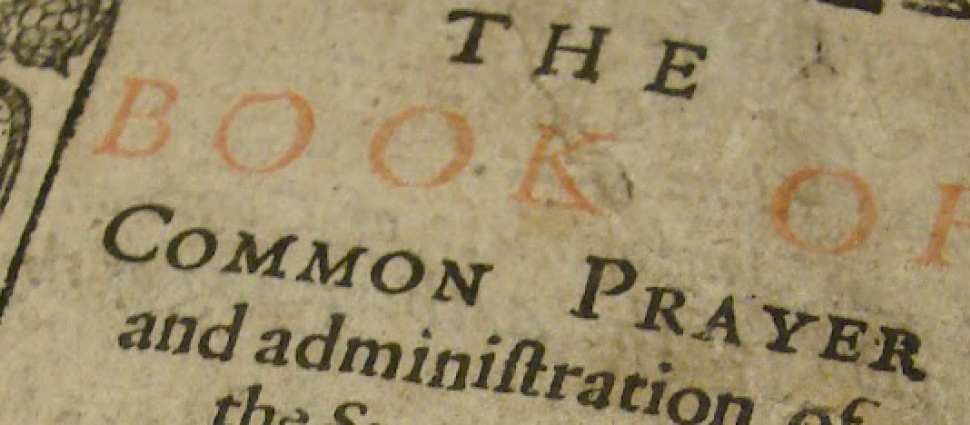Contending for the Faith

Feb 12, 2016
 From time to time I am asked why as an Anglican I include reading the Puritans as a discipline in my daily office of prayer (Anglican clergy take an oath to pray through Morning and Evening Prayer from the Book of Common Prayer). Many are scared off from reading the Puritans thinking they are too difficult to read. Others hear the echoes of a college lecture on the Puritans or Nathaniel Hawthorne’s Scarlet Letter warning them away. Others have a simple view of early Anglican history, thinking the Puritans were something other than Anglican. Thus most Anglicans (I can add Reformed and Presbyterians here!) combine all three to relegate the Puritans to "something Presbyterians and Baptists do.” Nothing can be further from the case! My role here at Meet the Puritans is to especially encourage my dear Anglican brothers and sisters to read the Puritans.
From time to time I am asked why as an Anglican I include reading the Puritans as a discipline in my daily office of prayer (Anglican clergy take an oath to pray through Morning and Evening Prayer from the Book of Common Prayer). Many are scared off from reading the Puritans thinking they are too difficult to read. Others hear the echoes of a college lecture on the Puritans or Nathaniel Hawthorne’s Scarlet Letter warning them away. Others have a simple view of early Anglican history, thinking the Puritans were something other than Anglican. Thus most Anglicans (I can add Reformed and Presbyterians here!) combine all three to relegate the Puritans to "something Presbyterians and Baptists do.” Nothing can be further from the case! My role here at Meet the Puritans is to especially encourage my dear Anglican brothers and sisters to read the Puritans. The Banner of Truth has done a great service for us through its Puritan Paperbacks series making their works accessible and readable. A good launchpad for Anglicans into the Puritans is to read Sermons of the Great Ejection. This little book is a collection of nine sermons preached in August 1662, the last Sundays before the new Act of Uniformity took affect. It recalls one of the great turning points in English Christianity—when nearly two thousand ministers left the established Church for conscience’ sake in what was called “The Great Ejection” into “non-conformity”. If the previous Act had remained in place (more about that later) these non-conforming ministers would have remained in their Church of England parishes.
I usually recommend this starter text for Anglicans for four reasons.
- The first is that it is a fine introduction to Puritan preaching. Nothing is more important than to hear these ejected pastors speak for themselves. You will read an urgency in their preaching that we lack today. Their watchword was that of Richard Baxter’s: I preach as never sure to preach again, and as a dying man to dying men.
- The second is that you get a range of different Puritans rather than one. And for Anglicans especially, eight were Anglican priests (read: presbyters/pastors) themselves, lawfully ordained in the Church of England. They are our heritage, don’t you think we should reclaim them?
- The third is that the sermons give you a sense of their heart before the Lord. This is the last opportunity these godly pastors will have to preach to the people for whom they have prayed, loved, and cared for over many years. You will be humbled by what you read. No calls of injustice or criticism of the government, but a solid and vital exhortation to the criticial doctrines of salvation. And for those of us who have paid the price of conscience for the sake of the gospel when were compelled to do the same, the former Episcopal Church bishop or rector who has been inhibitied and deposed will find comfort here.
- The fourth is that the issue of their day are directly relevant to our own: conformity. In a recent speech concerning the availablity of reproductive healthcare for women in the United States, a presidential candidate said, “Laws have to be backed up with resources and political will. And deep seated cultural codes, religious beliefs and structural biases have to be changed." When we proclaim the sovereignty of God, the elites of modern American society hear what they call “totalitarian thinking” that must be isolated and excised. Like the ejected of 1662, what it means to be a faithful believer before God and a faithful citizen of the commonwealth has changed.
May this little book be an encouragement to people of gospel truth and integrity everywhere. I hope you will join me as we meet the Puritans in its pages over the coming months.





